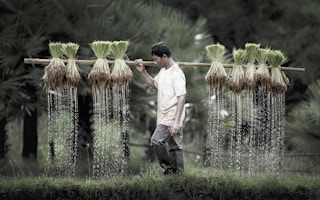Promoting sustainable agriculture requires a renewed focus on innovation and investment in research, technology and capacity development, FAO Director General José Graziano da Silva said at a meeting of agriculture ministers of the G20 in China.
“ICT helps in the monitoring of crop growth, utilisation of new techniques, field management and harvests,” the FAO Director-General stressed, adding that it has also become an essential tool for improving people’s livelihoods and welfare while advancing social justice and ensure equal access to opportunities, particularly in rural areas.
Telecommunication tools have the potential to provide Internet access for millions of people and connect farmers with digital agriculture. This includes the use of mobile phones to report animal disease outbreaks, which is one area FAO has been supporting in recent years.
Among the innovative ways FAO is using ICT, Graziano da Silva highlighted a new partnership with Google, whose satellite data and processing power will usher in an unprecedented level of environmental literacy, especially on forestry and fisheries, he said.
“
In order to ensure that farmers fully leverage the ICT opportunities, it is essential to provide digital tailored access, foster capacity development and facilitate the exchange of experiences.
José Graziano da Silva, director-general, UN FAO
The partnership is part of a larger digital strategy FAO is developing to integrate a wide range of technologies, ranging from satellite data to mobile phones and social platforms, with the agency’s work to support the most vulnerable with access to information and bottom-up learning.
“We have to bear in mind that small farmers in developing countries are often constrained in their access to inputs, technology, and markets. In order to ensure that farmers fully leverage the ICT opportunities, it is essential to provide digital tailored access, foster capacity development and facilitate the exchange of experiences,” he said.
In a communiqué released at the end of the meeting, ministers affirmed the importance of ICT in agriculture, calling it “essential to human, social and economic development,” and stressing “the potential to reach farmers —including smallholders and family farmers— with timely and accessible content on markets, sustainable and efficient farming practices and new technologies.”
The FAO Director General highlighted joint work between FAO and G20 countries on such projects as the Agricultural Market Information System (AMIS), the Tropical Agriculture Platform (TAP) and the G20 Technical Platform for the Measurement and Reduction of Food Loss and Waste.
He also underlined the ongoing international efforts to address Antimicrobial Resistance in partnership with the World Health Organisation and the World Organisation for Animal Health and called on G20 countries to support FAO in this endeavour.








